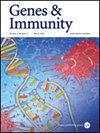免疫球蛋白GM和KM异体型和Fcγ受体2a基因型在肺部疾病对保守微生物多糖的体液免疫中的作用
IF 4.5
3区 医学
Q1 GENETICS & HEREDITY
引用次数: 0
摘要
由免疫球蛋白重链G (IGHG)和免疫球蛋白κ常数(IGKC)基因编码的免疫球蛋白GM (γ标记)和KM (κ标记)异型已被证明与对多种自身和非自身抗原的免疫反应有关。本研究的目的是确定GM和KM位点的等位基因变异是否与抗体对聚n -乙酰- d -氨基葡萄糖(PNAG)的反应有关,PNAG是许多微生物病原体表达的一种广泛保守的表面多糖。此外,我们希望确定Fcγ受体2a (FCGR2A)基因型是否也会影响抗体对PNAG的反应,FCGR2A基因型已被证明是某些病原体的危险因素。对257例不同肺部疾病(PD)患者的DNA进行了GM、KM和FCGR2A等位基因的基因分型,并对血浆进行了抗pnag IgG抗体的检测。IgG4 PNAG抗体水平与FCGR2A基因型相关(p = 0.01)。此外,KM和FCGR2A等位基因对抗pnag IgG3抗体应答有显著贡献:与所有其他基因型组合相比,具有KM 1/1或KM 1/3和FCGR2A R等位基因纯合子的受试者具有最高水平的抗pnag IgG3抗体。如果得到更大规模研究的证实,这些结果可能与针对许多表达pnag的感染性病原体的免疫治疗有关。本文章由计算机程序翻译,如有差异,请以英文原文为准。

Roles of immunoglobulin GM and KM allotypes and Fcγ receptor 2 A genotypes in humoral immunity to a conserved microbial polysaccharide in pulmonary diseases
Immunoglobulin GM (γ marker) and KM (κ marker) allotypes—encoded by immunoglobulin heavy chain G (IGHG) and immunoglobulin κ constant (IGKC) genes—have been shown to be associated with immune responsiveness to a variety of self and nonself antigens. The aim of the present investigation was to determine whether allelic variation at the GM and KM loci was associated with antibody responsiveness to poly-N-acetyl-D-glucosamine (PNAG), a broadly-conserved surface polysaccharide expressed by many microbial pathogens. In addition, we wished to determine whether Fcγ receptor 2 A (FCGR2A) genotypes, which have been shown to be risk factors for some pathogens, also influenced antibody responses to PNAG. DNA from 257 patients with various pulmonary diseases (PD) was genotyped for several GM, KM, and FCGR2A alleles, and plasma were characterized for anti-PNAG IgG antibodies. The levels of IgG4 antibodies to PNAG were associated with FCGR2A genotypes (p = 0.01). Also, KM and FCGR2A alleles epistatically contributed to anti-PNAG IgG3 antibody responses: subjects with KM 1/1 or KM 1/3 and homozygous for the R allele of FCGR2A had the highest levels of anti-PNAG IgG3 antibodies compared to all other genotype combinations. If confirmed by larger studies, these results are potentially relevant to immunotherapy against many PNAG-expressing infectious pathogens.
求助全文
通过发布文献求助,成功后即可免费获取论文全文。
去求助
来源期刊

Genes and immunity
医学-免疫学
CiteScore
8.90
自引率
4.00%
发文量
28
审稿时长
6-12 weeks
期刊介绍:
Genes & Immunity emphasizes studies investigating how genetic, genomic and functional variations affect immune cells and the immune system, and associated processes in the regulation of health and disease. It further highlights articles on the transcriptional and posttranslational control of gene products involved in signaling pathways regulating immune cells, and protective and destructive immune responses.
 求助内容:
求助内容: 应助结果提醒方式:
应助结果提醒方式:


